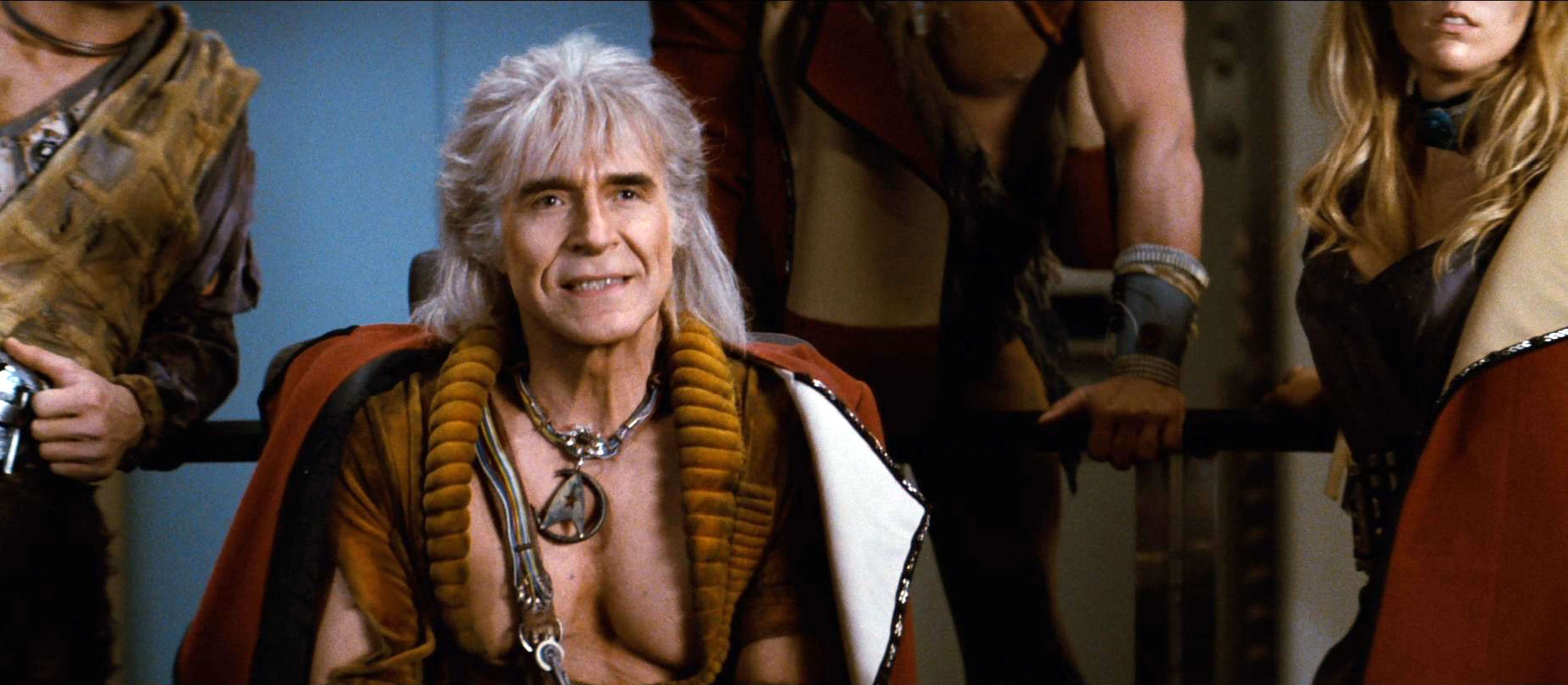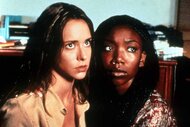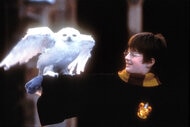Create a free profile to get unlimited access to exclusive videos, sweepstakes, and more!
Every Star Trek movie, ranked
Boldly go on a ranking of all 13 Star Trek films.

In 1979, Star Trek warped from television to the big screen. The franchise expanded faster than V'Ger. On December 6th, one of the franchise's best movies (and one of our favorites), Star Trek VI: The Undiscovered Country, celebrates its 30th anniversary.
The films began with the original cast from Star Trek: The Original Series. After six films, the movies transitioned to feature the cast from Star Trek: The Next Generation, and then in 2009, a new timeline of films branched off with recast legacy characters and much bigger budgets. What will the next Trek movie be, and which crew will it feature? Who knows, but it’s only a matter of time before some Trek project boldly goes to the cinema once more.
In the meantime, we’re going to rank all of the existing 13 films in the canon. It’s more of a celebration than anything else; most of these movies we love. We don’t dislike any of them. Which one are we going to throw on at any given moment? It depends on the day, it depends on the hour, it depends on which crew we want to journey with.
Full impulse and prepare for warp, because only Nixon could go to China. Here’s our ranking of the 13 Star Trek feature films.
13. Star Trek Into Darkness (2013)
J.J. Abrams' last Star Trek movie as director, Into Darkness, is his worst film. His much-loved “Mystery Box” approach, which only really works as a marketing tool, fails him on a story level when we learn who the villain really is (as if we didn't know already). It's a movie where the head of Starfleet is totally fine violating Federation principles and risking war with the Klingons to cover up his secret plans with an all-out military strike (which, as cover-ups go, not very discrete), but, if you’re Jim Kirk and you're caught lying, then he must uphold the very rules he's taking seven photon torpedoes to. If you like movies where heroes lie to save their own ass and put their crews’ in a wringer, or stories that lurch from one set piece to another with inconsistent characterizations and little emotional resonance, or that remix bits from Wrath of Khan without earning it, then appreciating why it is the best, then Into Darkness is for you.
12. Star Trek: Nemesis (2002)
Traditionally, even-numbered Trek films are high points for the franchise. The tenth installment, and the fourth film featuring the Next Generation cast, broke that tradition.
Nemesis is a dull, rough draft of a movie that feels and operates like big-budget fan-fic, one that is surprisingly tone-deaf in regards to how to portray these characters — especially, and frustratingly, Picard in the first half. An overabundance on Romulan political intrigue gets in the way of enjoying or appreciating what few moments in the story are truly worthy of our attention, as Tom Hardy's Shinzon (a young and bald clone of Picard) challenges his (wait for it) nemesis in a big CG space battle where Shinzon's massive planet-killing ship and Picard's Enterprise collide. The movie bombed, killing future missions from this crew. It would take Paramount seven years to recover with J.J. Abrams' reboot.
11. Star Trek: Insurrection (1998)
Saddle up, lock and load! The second Trek movie directed by Jonathan Frakes is, rightfully, the movie that gave us the "Riker Manuever." Turns out that it has nothing to do with the way Riker sits in chairs.
Picard and the Enterprise crew get swept up in a rather uneventful conflict between the nasty Son'a and the ever-peaceful Ba'ku. The latter alien race inhabit a lovely planet that keeps you young and has various other magical powers. Starfleet wants to work with the Son'a to harness the planet's abilities, thanks to another wicked Admiral, and he's dealing dirty with the lead Son'a... played by none other than Oscar-winner F. Murray Abraham. Picard won't stand for it, so he launches the titular insurrection and goes after Space Salieri to save the Ba'ku.
Insurrection plays like an extended episode of TNG; no more, no less. Donna Murphy plays a love interest to Picard, and though we are big fans of hers, giving more screentime to, say, Beverly Crusher, would have been a better choice for this story. After the glory of Star Trek: First Contact, the stakes felt a little small but we still enjoy it.
10. Star Trek V: The Final Frontier (1989)
"What does God need with a starship?" Good question.
Star Trek V: The Final Frontier got clobbered in the Summer of '89 by the likes of Batman and Indiana Jones; William Shatner's directorial debut's low, low budget and really bad special effects just couldn't compete with the other blockbusters. Neither could Final Frontier's messy and largely passive story that tries too hard to capture the lighting-in-a-bottle mix of comedy and sci-fi that turned Voyage Home into a hit. Despite being one of the lowest grossing Treks ever, this misfire does feature a few strong moments, especially when God-searching Sybok confronts his half-brother, Spock, and McCoy with their secret pains. (And we don't mind the funny campfire scene with Spock and "Row, Row, Row Your Boat" either.)
9. Star Trek: The Motion Picture (1979)
The one with V'Ger.
The first big-screen Trek movie is definitely an acquired taste. Legendary director Robert Wise made a great science fiction movie, but it doesn't always feel like Star Trek. The pace is slow, but the ideas and themes the movie explores during its slog of a runtime are incredible. You just have to get past the blaring alarms, the nonsensical murdering transporters, and the cabana boy beach uniforms.
William Shatner brings a lot of hubris to this new Kirk, and Kirk makes some bad decisions because of it. Leonard Nimoy is the highlight of the movie (shocker), giving us a Spock that wants to purge himself of emotions. That changes when he discovers the V'Ger entity. The mysterious being that is moving toward Earth is cold and unfeeling, and Spock realizes that he doesn't want to be like that. V'Ger's true identity, once revealed, is a great payoff.
Still, most of the movie features one ship trying to stop a giant cloud. Patience will be rewarded here, and the rewards include some of the weirdest and most beautiful images in any Trek movie. Jerry Goldsmith's score is likely the movie's greatest asset, as none of it (especially Kirk and Scotty's famously long shuttle approach to the Enterprise) would work without it.
8. Star Trek: Generations (1994)
The one with Malcolm McDowell.
After Picard and company sailed off at the end of their television finale, they flew right into this 1994 film from David Carson. It was the first big-screen showing for the TNG crew, and it brought some old favorites back as well. Captain Kirk, Chekhov, and Scotty start off by christening the Enterprise-B back in their era, and, in record time, the ship gets caught up in an anomaly called the Nexus. Kirk is lost and presumed dead. Cut to the TNG era, and a dimly-lit Enterprise-D encounters the Nexus' number one fan, the sinister Dr. Soran (McDowell). He wants to get back to the Nexus, having survived the encounter that Kirk didn't aboard the B. The Nexus is pure joy, and it is only there that Soran feels he can escape the pain of having lost his family to the Borg years ago.
Captains Kirk and Picard finally meet to stop Soran and save the galaxy, but the end result is rather "meh." A great (if too long) crash sequence involving the Enterprise-D and vivid cinematography are among the film's few high points, unless you have always wanted the greatest captains ever to meet-cute over (we sh** you not) chopping firewood and making eggs. And Kirk's death lacks the emotional impact that both the iconic hero and his fans deserve.
7. Star Trek Beyond (2016)
The best odd-numbered film since Star Trek III: The Search for Spock, Star Trek Beyond is waaaay better than its predecessor, Star Trek Into Darkness (Phew.) It celebrates what makes Trek so great, its themes and characters, while honoring the franchise's 50th anniversary with a very entertaining mix of humor, heart, and spectacle. We'd rank it higher if not for the problematic execution of villain Krall (a surprisingly ineffectual Idris Elba), whose motivations (while solid on paper) are denied the necessary screentime to truly connect. But director Justin Lin (of Fast & Furious fame) mostly overcomes that, as well as certain tonal and narrative bumps, thanks to making the first of these nuTreks to feel like a $200 million episode of The Original Series. Beyond leaves us feeling that which STID failed to do: Wanting more.
6. Star Trek III: The Search for Spock (1984)
Leonard Nimoy returns as Spock with his feature film directorial debut that bridges the events of Star Trek II with Star Trek IV with an earnest and assured, if not visually dynamic, approach. The story packs a considerable emotional punch, as well as some of the series most iconic moments — the death of Enterprise, Kirk's heartsick reaction ("Klingon bastards!") to the murder of his son, David — as the Enterprise's crew puts their careers and lives on the line to save both a resurrected Spock and a compromised McCoy. The latter is suffering from the effects of a super Vulcan mind meld; Spock used it to transfer his essence and consciousness into McCoy like one would backup files to the Cloud.
The Search for Spock competently explores the toll of Kirk's efforts to prove to Spock that sometimes the needs of the one outweigh those of the many, even if it means stealing the Enterprise in a stirring sequence. While Trek III isn't the most ambitious or exciting Trek movie, it is one of the most heartfelt adventures in the series. A necessary throat clearing of sorts before the franchise can reach its then-highest point.
5. Star Trek: First Contact (1996)
While Star Trek: First Contact is the second film featuring Captain Picard (Patrick Stewart) and the rest of the Star Trek: The Next Generation crew, it is the first full solo outing for the TNG cast. The hit sequel, which recently celebrated its 25th anniversary, also proved to be better than TNG’s maiden big-screen voyage, 1994’s uneven Star Trek: Generations. Free from the studio-imposed story mandates that Generations had, writers Ronald D. Moore and Brannon Braga delivered an action-packed and emotionally compelling adventure that pit Picard against his most lethal enemy: The Borg, a race of cybernetic beings hellbent on going back in time to assimilate Earth at a vulnerable point in its history. Making the stakes that much higher was how Picard’s past trauma with the Borg threatened to get in the way of saving humanity’s future, as his experience being assimilated into their collective boiled over into revenge.
In between explosive space battles and tension-filled set pieces featuring a Borgified new Enterprise, first-time feature director (and Next Gen actor) Jonathan Frakes gave fans a Star Trek movie unlike any other; a riveting, action-horror sci-fi blockbuster that was only the second Trek film at the time to ever achieve crossover audience appeal outside the core fanbase. (The first was 1986’s time-traveling, “save-the-whales” romp Star Trek IV: The Voyage Home).
4. Star Trek (2009)
It’s telling that J.J. Abrams has remade Star Wars twice and that his actual Star Wars movie is the second-best one.
2009’s Star Trek is still a nearly unparalleled dazzler, a canny prequel and inspired reboot that feels wholly fresh and original, with a nifty plot (involving time travel and alternate timelines) that wisely (albeit in a complicated way) doesn’t negate the films that came before it. Abrams brilliantly cast the movie, introducing a host of fresh faces playing iconic roles that, by the time the film was released, had become more punchline than anything else. (Star Trek: Nemesis was an inglorious end to the Enterprise’s big-screen adventures, critically lambasted and commercially ignored.)
Breathlessly told, Star Trek has some of the biggest and most inventive set pieces (the opening attack sequence, particularly when the sound drains away during a key moment to leave room for only Michael Giacchino’s soaring score, is enough to bring tears to your eyes), as well as memorable new characters (Eric Bana’s Nero is a wry and scary baddie). After the promise of Mission: Impossible III, Abrams showed himself to be an honest-to-goodness filmmaker, able to improbably invigorating moribund franchises with vitality, humor and boundless energy. It feels like we have watched Star Trek a thousand times and it also feels like we could watch it a thousand more.
3. Star Trek IV: The Voyage Home (1986)
The one with the whales.
It's not just the funniest Star Trek movie, it's one of the funniest movies ever. Large credit goes to director Leonard Nimoy and the movie's late producer and co-writer, Harve Bennett.
A weird probe (its origins never explained) comes to 23rd-century Earth looking for whales. Humpback whales, specifically. But, since they are extinct, Kirk and his crew aboard a stolen Klingon vessel must slingshot around the sun to travel back in time to 20th-century San Francisco and save two whales just in time to warp back to the future and save the day.
It's such a cockamamie plan, sure, but part of the fun is seeing the characters both acknowledge it is a stretch and then commit fully to it. There are no consequences to messing with time, the crew just romps around San Francisco and does what they want. They alter history (hello, transparent aluminum!) and invade Naval vessels. But along the way, the movie takes some big comedic swings with the hilarious "fish out of water" story Spock and Kirk find themselves in as they don't need photon torpedos to save the day. Just their wits. The film is full of sweet, funny, and surprisingly poignant moments and still remains, 35 years later, a classic comedy and essential Trek film.
2. Star Trek VI: The Undiscovered Country (1991)
It’s fitting that one of the filmmakers responsible for putting Trek’s big-screen franchise back on track would return to wrap up the voyages of the The Original Series cast. Wrath of Khan writer-director Nicholas Meyer’s second Star Trek feature, Star Trek VI: The Undiscovered Country is, at times, arguably more confidently executed and rich with character beats than his former (and well-regarded) entry. The movie embraces the characters’ twilight years as a plot point by putting the aging crew of the past-her-prime Enterprise in the middle of a conspiracy that threatens to light the fuse on continued conflict between the Federation and the Klingons.
The Cold War parallels here between the then-fall of the Berlin Wall and our sci-fi heroes and their nemesis lend Trek VI an urgency and intrigue on par with ‘60s political thrillers, with Meyer’s propulsive whodunit of a script (cowritten by the late Denny Martin Flynn) affording the franchise to boldly go explore new genres like the murder mystery and POW, Great Escape-esque war dramas. (There’s also some great courtroom drama flourishes as well, on top of an exceptional Run Silent, Run Deep-inspired space battle between the Enterprise and a Klingon bird-of-prey that can fire while cloaked.)
From Kirk sporting grey hair, to the characters expounding upon their relevancy and usefulness as they are all that stand between us and the brink of full-scale war, Star Trek VI is a taut, clever picture that always puts story and character first and never fails to deliver on the emotional resonance of either.
1. Star Trek II: The Wrath of Khan (1982)
Following the events of "Space Seed" in The Original Series, Khan Noonien Singh (Ricardo Montalban) comes to get revenge on Admiral... Admiral... James T. Kirk in the rousing intimate epic that is Star Trek II: The Wrath of Khan. A cat and mouse game of dueling starships ensues, with Kirk commanding an Enterprise full of trainees. A dangerous science project called "Genesis" is in the mix, too, and Khan wants it to help him conquer the galaxy. Kirk wins in the end, bit loses his best friend in the process.
The most thematically and emotionally rich film in the series, Khan is still the benchmark to which all subsequent Treks aspire to match or exceed. Not only is it the best big-screen mission ever for the Enterprise, it's also one of the best science fiction films of all time.
This movie set a new bar for Trek greatness. We don't think we're being hyperbolic when we say that it is damn near perfect. We'll watch it "'round the moons of Nibia, and 'round the Antares maelstrom, and 'round perdition's flames before we give it up."

























